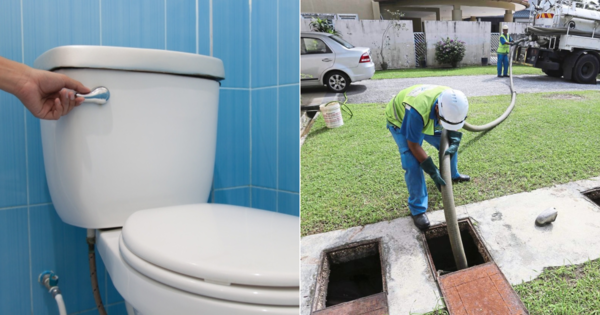Cover image via
C&EN – American Chemical Society
& Indah Water Konsortium
Subscribe to our Telegram channel for our latest stories and breaking news.
Sewage is wastewater that comes from everyday activities we usually take for granted. This includes the water used to flush toilets, toilet paper, human waste, food waste, soaps, and detergents — basically anything that goes down a drain at home.
However, sewage does not magically just disappear.
In Malaysia, we produce an estimated five billion litres of wastewater daily (equivalent to approximately 2,000 Olympic-sized swimming pools), which has to go through sewage treatment plants before being released back into the water cycle.
Whenever we flush items that are not poop, pee, and toilet paper down the toilet, or pour oil and food sediments into the kitchen sink, we are actually making life harder for the people who treat our sewage.
In fact, these bad practices could lead to clogged pipes, sewage water backflow, and more unnecessary problems.
When it comes to sewage treatment, Indah Water Konsortium adheres to the strict standards imposed by the Department of Environment.
Here’s why good sewage treatment is so important:
1. It helps prevent the spread of water-borne diseases
2. It encourages potential investors to set up factories
3. During a water shortage, treated wastewater can be used for irrigation, industrial purposes, and landscaping
4. Helps protect the water from high Biochemical Oxygen Demand levels, which can affect aquatic life
On the other hand, homes with septic tanks are charged RM2 to RM6 a month, when the actual cost incurred by Indah Water Konsortium is RM22 a month.
Since its inception in 1994, Indah Water Konsortium has not changed its tariff for domestic users. Over the years, despite a steep rise in operational costs, inflation, and many other factors, Indah Water Konsortium has continued to provide Malaysians with reliable sewerage services, despite operating at a loss.
To put things in perspective, Indah Water Konsortium has lost an average of RM90 million a year between 2017 to 2020. Furthermore, they have accumulated a total of RM760.19 million in sewerage bill arrears up to December 2020 — Indah Water Konsortium’s cumulative bill amount was RM9.7 billion in 2020.
In order to provide good sewerage services for users, Indah Water Konsortium will need to continue improving and upgrading all sewage treatment facilities in the country. This is critical in protecting our water resources and ensuring a cleaner environment for all Malaysians.
However, all of this will require substantial funds, which are largely derived from tariff charges.
For homes with connected sewerage systems, the suggested tariff adjustments will be introduced gradually, so as to not burden customers financially.
Currently, homes with septic tanks are currently charged RM2 to RM6 a month for desludging services, which occur once every two to three years, depending on location. Overall, the total amount can add up to around RM144 to RM216 per service.
The proposed rates mean customers will be charged a one-off RM192 fee for desludging services, and can choose to pay it in one go or to convert the payment into a 24-month instalment plan, at RM8 per month.
Overall, the increase in tariffs is minimal, so users won’t have to worry about forking out a lot more money than usual for their regular Indah Water bills.
The additional funds received from the tariffs will be used by Indah Water Konsortium to:
– Balance the increasing costs of operation
– Minimise operation risks and adhere to high standards of sewage treatment
– Minimise the risk of pollution at each of its treatment plants
– Update and replace ageing equipment in stages
– Enable consistent upgrades in technology and efficiency



